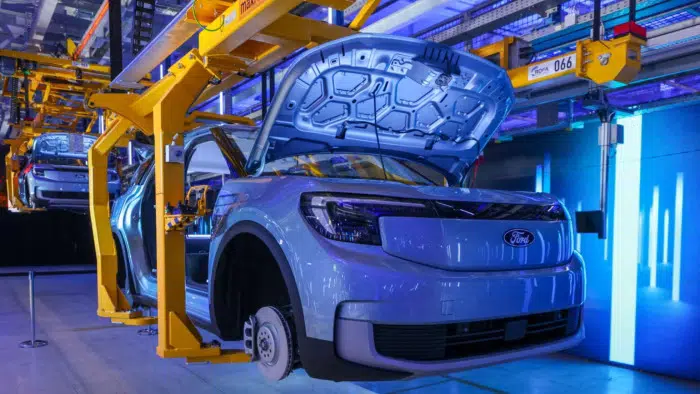Ford, the renowned US automaker, is set to inject up to €4.4 billion into its debt-ridden German subsidiary, Ford-Werke, as part of its strategy to revive its ailing European business. This move comes as Ford continues to grapple with mounting losses in the region and intensifying competition, particularly from Chinese car manufacturers.
Reviving Ford’s European Business
In a bid to restore profitability, Ford Vice-chair John Lawler emphasized that the company would not exit its European operations, despite the financial challenges. Speaking to the Financial Times, Lawler called on the European Union and the German government to take more aggressive steps to support the electric vehicle (EV) sector. He noted that the transition to EVs in Europe has faced slower-than-expected adoption rates, which has had significant financial implications for automakers.
“We should set a path and figure out how we’re going to make this viable, and that’s what we’re intending to do,” Lawler said, reaffirming Ford’s commitment to its operations in Europe.
A Strategic Recapitalization of Ford-Werke
The €4.4 billion capital infusion will help alleviate Ford-Werke’s more than €5 billion debt load. This strategic recapitalization also marks the end of Ford’s long-standing commitment to cover any losses incurred by its German subsidiary, which has been in place since 2006.
Instead of continuing to shoulder the subsidiary’s losses, Ford has pledged to allocate hundreds of millions of euros over the next four years to strengthen Ford-Werke. This will help ensure its sustainability and ability to compete in the increasingly competitive European market.
Focus on Electric Vehicles and Cost Reduction
Ford’s transition to electric vehicles is at the core of its strategy to turn around its European business. The company has already invested $2 billion in transforming its Cologne plant to produce EVs. Ford plans to reduce the number of models in its lineup, focusing more on its van business and other high-demand areas in the market.
Despite these efforts, Ford has struggled to turn a profit in Europe. The company recently announced plans to cut around 4,000 jobs in the region, including 2,900 positions in Germany. These job cuts are part of Ford’s strategy to streamline its operations and focus on more profitable areas of its business.
The cuts will also affect the production of the electric Explorer SUV and the electric Capri, both of which are built in Germany.
Resistance from IG Metall and Job Cuts in Germany
Trade unions, notably IG Metall, have strongly opposed Ford’s decision to lay off workers at the Cologne plant. IG Metall has accused Ford of using underhanded tactics to pressure the works council into accepting job cuts, despite a previously agreed employment guarantee until 2032.
On Monday, IG Metall denounced Ford’s actions as “a very dirty trick” aimed at bypassing the protections in place for the workforce. The union also criticized Ford’s attempt to force the works council into making concessions.
Additionally, the future of Ford’s other German plant in Saarlouis remains uncertain. The company had planned to sell the facility, but negotiations have stalled, leaving thousands of jobs in limbo.
Global Struggles in the Electric Vehicle Market
Ford’s EV business has not been as successful as anticipated. Last year, the company lost $5 billion in its electric vehicle division and does not expect to break even until later in the decade. Lawler explained that the electric transition has not progressed as quickly as expected and requires “tough decisions” in order to remain competitive.
The company is pinning its hopes on a new vehicle platform set to launch in 2027, which is expected to drastically reduce the costs associated with EV production. Until then, Ford is focused on maximizing its current assets and improving its cost structure.
The Need for EU Support in the EV Transition
Lawler is vocal about the need for more robust government support to accelerate the transition to electric vehicles. While the European Commission recently eased stricter emissions rules on petrol vehicles, allowing automakers to avoid heavy fines until 2027, Lawler argues that further incentives are needed to stimulate demand for EVs.
“We all have plenty of supply of EVs into the marketplace. It’s a demand issue,” Lawler stated. “We have to start attacking the root cause.”
Ford is not the only automaker facing challenges in the EV market. Sales of electric vehicles in key European markets, such as Germany and France, have plummeted after governments reduced or eliminated subsidies for EV purchases. This downturn in demand has made it difficult for automakers to sustain their EV production efforts.
The Role of the European Union
Lawler’s call for more EU action highlights the critical role that governments play in shaping the future of the automotive industry. According to Lawler, European governments need to provide more incentives for consumers to purchase EVs, as well as support manufacturers in reducing production costs.
The EU’s efforts to support the transition to electric mobility are crucial in maintaining Europe’s position as a global leader in the automotive sector. However, as Lawler pointed out, governments need to act swiftly and decisively to create a more favorable environment for electric vehicle adoption.
Conclusion
Ford’s €4.4 billion investment in its debt-ridden German subsidiary is a critical step in securing the future of the company’s European operations. However, as Ford faces mounting pressure from cost reductions, job cuts, and slow EV adoption, it is clear that more needs to be done at the government level to support the electric vehicle transition.
The ongoing challenges faced by Ford in Europe are not unique. Many other automakers are grappling with similar issues as the region’s automotive industry navigates the shift to electric mobility. Ultimately, the success of this transition will depend on cooperation between manufacturers, governments, and consumers to create a sustainable and competitive electric vehicle market.
YAllA TV – www.yallatv.ae





